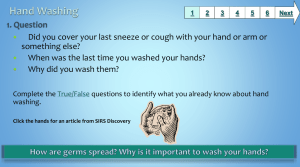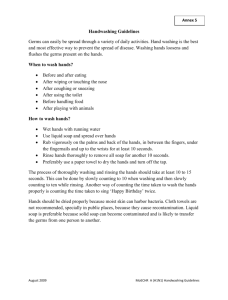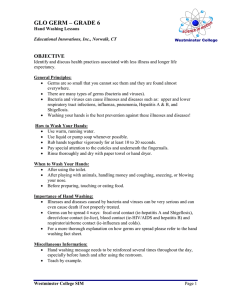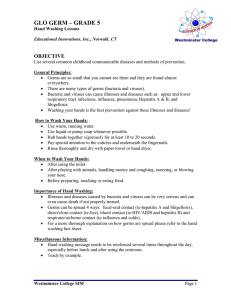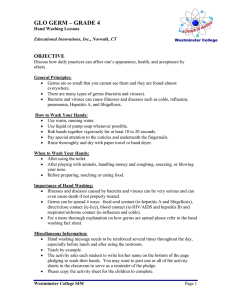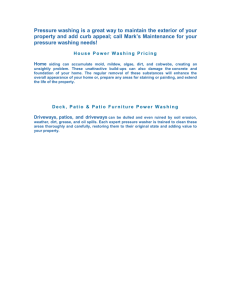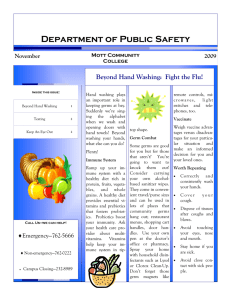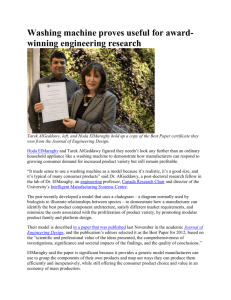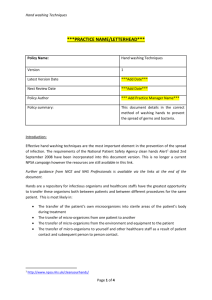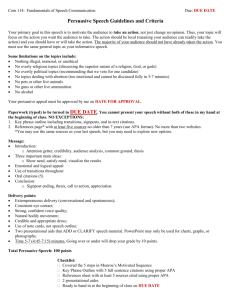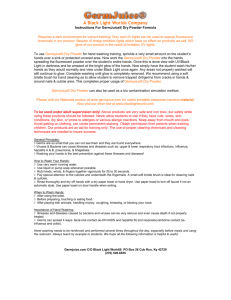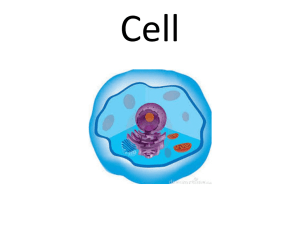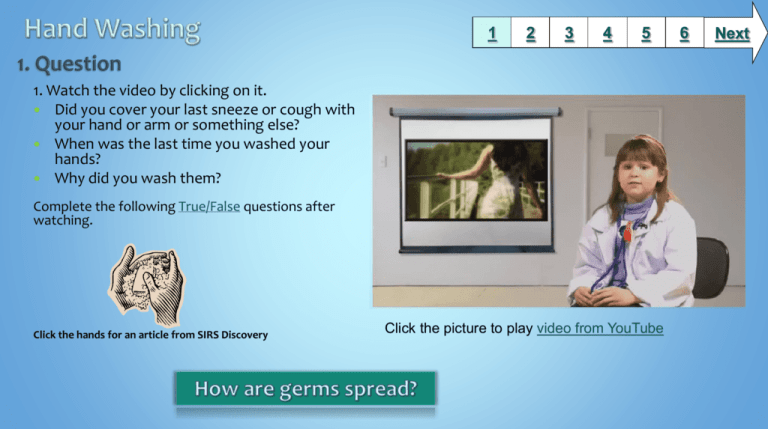
1
2
3
4
5
1. Watch the video by clicking on it.
Did you cover your last sneeze or cough with
your hand or arm or something else?
When was the last time you washed your
hands?
Why did you wash them?
Complete the following True/False questions after
watching.
Click the hands for an article from SIRS Discovery
Click the picture to play video from YouTube
6
Next
1
Click on the hands washing to
watch the video.
2
3
4
5
Clean Hands Song
The sneezing boy wants you to read
some important information from
Kids Health about hand washing.
Use the knowledge you just gained to correctly complete
the hand washing quiz by clicking on the bubbles.
Music Video From YouTube
6
Next
1
Meet The Scrub Club
and watch
WebisodeOne
Click on the soap to sequence the steps for
properly washing your hands.
If you are asked to login, ask your Library Media Specialist.
2
3
4
5
6
Next
1
2
3
4
5
6
You will now answer two questions on when
you should wash your hands and why.
Think about all you viewed today throughout
the lesson.
Remember to include your name on the
document and send the document to the
printer.
Questions
Be sure to check out the
next slide for some fun
extension activities!
Next
1
Draw About It!
*NOTE: Go to the BCPS Database page and click on
BrainPOP Jr., then return to this slide and click on the
activity link above.
Hand Washing Game
Meet Gel-Mo by reading his
story here.
Scrub Club Games
2
3
4
5
6
Next
1
BCPS Curriculum
Health Education – Grade 1
Steps for Hand Washing Module 3 Lesson 7
O-5 The student will identify basic ways to prevent the spread of germs.
KSI-A Develop an awareness of signs of illness and identify steps for communicating illness.
KSI-B Identify germs as a cause of disease and list ways to limit the spread of germs.
KSI-C Discuss the proper steps for hand washing.
Maryland State Curriculum
Standard 7.0 Disease Prevention and Control
Students will demonstrate the ability to apply prevention and treatment knowledge, skills, and strategies to reduce
susceptibility and manage disease.
TOPIC
B. PREVENTION PRACTICES
INDICATOR
1. Identify basic ways to prevent the spread of germs.
OBJECTIVES
Define germs.
2
3
4
5
6
Time Frame:
1-2 50 minute class period(s)
Differentiation:
Direct students to use comprehension tools included in
databases, such as: audio read-aloud and embedded
dictionaries.
Create a voice thread with the questions from the
true/false document and the hand washing quiz. Allow
students to record their answers.
Learning Styles:
Audio
Visual
Describe ways germs can enter the body.
Common Core State Standards
Reading: 1. Read closely to determine what the text says explicitly and to make logical inferences from it; cite specific textual evidence
when writing or speaking to support conclusions drawn from the text.
Writing: 7. Conduct short as well as more sustained research projects based on focused questions, demonstrating understanding of the
subject under investigation.
Standards for the 21st Century Learner
1.1.6 Read, view, and listen for information presented in any format (e.g. textual, visual, media, digital) in order to make inferences and
gather meaning.
2.1.3 Use strategies to draw conclusions from information and apply knowledge to curricular areas, real-world situations, and further
investigations.
Maryland Technology Literacy Standards for Students
3.0 : Use a variety of technologies for learning and collaboration.
Notes to the teacher:
Students will need headphones
On the student shared drive, create a folder for your class
preferably with a folder for each student, to save their work.
You may need to login to BrainPop the first time. See your
Library Media Specialist for the passwords.
Last update: July 2014
Created by Angela Sofinowski
BCPS Research Module or Slam Dunk Model, Copyright 2013, Baltimore County Public Schools, MD, all rights reserved. The models may be used for educational, non-profit school use
only. All other uses, transmissions, and duplications are prohibited unless permission is granted expressly. This lesson is based on Jamie McKenzie’s Slam Dunk Lesson module available
at http://questioning.org/module2/quick.html.

